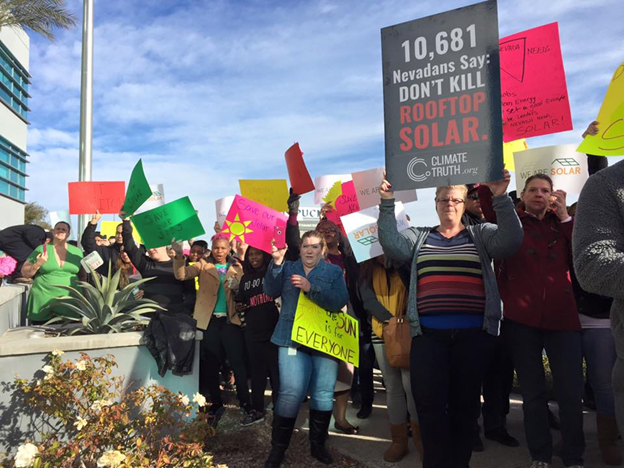Almost a year ago, Nevada regulators sent shockwaves through the solar world with an unprecedented move against rooftop solar customers. However, the subsequent backlash from Nevadans, the solar industry, and even Republican Governor Brian Sandoval has clearly reversed the momentum, and 2017 could see the state’s previously-flourishing solar industry restored to good health.
Last December, the Nevada Public Utility Commission (PUC) dropped a bombshell. They announced a plan to slash the net metering rates utilities would be required to pay for customer-sited rooftop solar generation by 75% and increase fixed charges for solar customers, moves which would undermine the economics of going solar to the point where leading installers shut down operations in the state and new solar applications dropped by 90%. Even more dramatically, in an unprecedented move the PUC also voted to make the changes retroactive — meaning that it would also harm the investments that tens of thousands of Nevadans had already made in going solar.
The controversial move provoked an outcry from the state’s fast-growing solar constituency, which turned out in force to oppose the decision — literally, in the case of one widely-reported incident of protestors showing up to a PUC meeting openly carrying firearms! The backlash against the Republican-appointed regulators also threatened to become a major political issue nationally, with both Democratic presidential candidates condemning the decision during the primaries and commentators speculating that the issue could play a significant role in keeping this critical swing state in the Democrats’ column in November. More worryingly for the solar industry were concerns that the decision could set a dangerous precedent for anti-solar utilities and regulators in other states.
Fortunately, subsequent events have shown that the setback for Nevada solar is likely to be a temporary one. Republican Governor Brian Sandoval, who almost immediately sought to distance himself from the PUC’s decision, convened a New Energy Industry Task Force in the spring to develop policy recommendations that would “encourage development of clean energy sources and integrate renewable energy technologies into Nevada’s energy sector,” including a specific focus on rooftop solar and net metering. This shift in momentum was further reinforced in July when Gov. Sandoval announced that he would not be reappointing the regulator that presided over the net metering changes, expressing the need for “a fresh perspective and a new direction.”
Last month, Nevadans finally saw this new approach begin to bear fruit. First, after repeated peacemaking attempts by both the solar industry and utility NV Energy, regulators finally approved a negotiated “grandfathering” proposal that will restore the previous net metering tariffs for customers that had either already installed solar panels or planned to before the start of the year. This move, which would essentially roll back the PUC’s decision to make its new solar compensation rates retroactive, will benefit over 32,000 Nevadans as well as solar installers that will now have 15,000 new customers that had applied for net metering rates but had not yet completed their installations as of last December.
Even more encouragingly, the task force subsequently approved a host of progressive policy recommendations that crucially include a recommendation for the reinstatement of retail net metering for consumers — a move that would effectively complete the reversal of the PUC’s fateful ruling. This recommendation was just one of many wide-ranging proposals to increase renewable energy development in Nevada and promote energy efficiency, energy storage, and electric vehicles, including a proposal for a Next Generation (NextGen) Communities policy that would incentivize the construction of housing developments powered exclusively by solar-plus-storage.
While legislative action in 2017 will still be required to enact these proposed reforms, the moral of the saga in Nevada is becoming increasingly clear. Far from setting a dangerous new precedent, Nevada may end up being a cautionary tale for anti-solar utilities and conservative regulators: the home solar constituency is strong, growing, and ready to fight back. As the recent, historic steps to ratify the global Paris Agreement on climate change demonstrated, the momentum for the clean energy economy is unstoppable — and the people power is ensuring that it stays that way.
